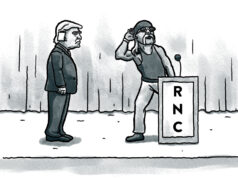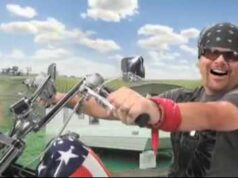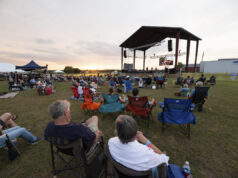
Americans are bracing for a fight — against ourselves.
Regardless of how the upcoming #Election2020 political battles are fought, our democracy is in danger. American democracy needs conversations about how we can reunite and rebuild. As is so often true, we should embrace the wisdom, eloquence, and grace in Bruce Springsteen’s lyrics and characters.
Springsteen’s Western Stars album was released in 2019 along with a film of his performances. It isn’t partisan. The name of President Donald Trump is never used. Instead, the album is about more than the Trump era and its anxiety. Springsteen portrays the fears of our post-frontier nation. He puts a face on individuals from the environments where Trumpism flourishes. Springsteen makes us come to grips with the humanity of people struggling with modern culture.
‘Hello sunshine, won’t you stay?’
As today’s conflict escalates, Western Stars pulls us into the souls of even our most combative neighbors, while exploring other, long-standing American themes. Without mentioning politics, Springsteen implicitly reteaches the principle: My opponent is my opponent, not my enemy.
Hello Sunshine is likely influenced by Springsteen’s own battle with depression. He sings:
I had a little sweet spot for the rain
For the rain and skies of grey
Hello sunshine, won’t you stay?
Springsteen recalls the mixed legacy of frontier individualism, as well as community. Listeners have to identify with his character who “always loved a lonely town” but who ends up on, “Those empty streets, no one around.”
Our political malaise is rooted in stagnating regions where emptiness has reached epidemic levels. Everyone can think of their own experiences or their friends and families who can “get a little too fond of the blues.” But shouldn’t we also bond with people in parts of America where once-hopeful communities are crashing? Shouldn’t we celebrate them when they say, “Hello sunshine, won’t you stay?”
Springsteen’s Chasin’ Wild Horses, Hitch Hikin’ and The Wayfarer are expressions of the pioneer spirit. But in the time of 21st century globalism, we’ve lost the experiences where:
You come rollin’ ‘cross my mind
Your hair flashin’ in the blue
Like wild horses, just like wild horses
Just like wild horses
Americans no longer emulate Woody Guthrie by sticking a thumb out and hitching a ride. Today’s Americans may be as lost as any wayfaring stranger, but we can:
Find peace here on the sweet streets, the sweet streets of home
Where kindness falls and your heart calls for a permanent place of your own.
One legacy of our aspiration to Drive Fast is that Trumpland has a disproportionate number of men like the one who:
Got two pins in my ankle and a busted collarbone
A steel rod in my leg, but it walks me home
At nine, I climbed high into the boughs of our neighborhood’s tallest tree
I don’t remember the fear, just the breeze
Our risk-taking and a popular culture romanticizing adventure has produced too many individuals in chronic pain — physical or mental — who tell themselves, “Look what you have done.”
‘Stones in my mouth’
Yes, humans deceive ourselves, but in the age of “truth decay,” Springsteen’s lyrics in Stones are exceptionally poignant:
I woke up this morning with stones in my mouth
You said those were only the lies you’ve told me
Those are only the lies you’ve told me
I pulled my collar to the wind and spit them on the ground.
Two songs that begin with cryptic references to pills are illustrative of Springsteen’s narrative. Tucson Train could simply be a new version of lost love, loneliness, and recovery. Any forlorn lover could sing:
We fought hard over nothing
We fought ’til nothing remained
But we can’t fail to respect the song’s character, who has struggled with addiction, earned a crane operator’s license, used hard work in the hard sun to clear his mind and is now celebrating, “My baby’s coming in on the Tucson train.” And how can we not acknowledge that Trumpism is a legacy of the post-industrialism that has prompted similar suffering throughout middle America?
The second pill reference foreshadows the climax of the title song, Western Stars (video above). Everyone constructs cultural myths, such as the metaphor introducing the narrative:
Wake up in the morning, just glad my boots are on
Instead of empty in the whispering grasses
Down the Five at Forest Lawn
The climax is anticipated by a conversation:
Some lost sheep from Oklahoma sips her Mojito down at the Whiskey Bar
Smiles and says she thinks she remembers me from that commercial with the credit card
Embrace the whirlwind and fight hard
To me, Western Stars is about more than the cultural origins of Trumpism. Springsteen’s latest lyrics touch a wide range of personal struggles, as well as emotions that seem uniquely pertinent in our times. For instance, the pain in the song Drive Fast should prompt us to accept its challenge: “Look what we have done.”
Similarly, There Goes My Miracle is about a woman “walking away, walking away” from their relationship. It’s also accepting blame for the parting. That hits extra hard when democracy could be our miracle that also is walking away.
We all do it differently, but in this time of crisis, who doesn’t seek comfort in the old ways?
Our American brothers may draw on different cultural themes, as if we can “ride and rope” back to our so-called “manifest destiny.” The American Century has passed, but if we embrace the whirlwind and fight hard for common values that must remain, who knows where the Western Stars can lead us?




















